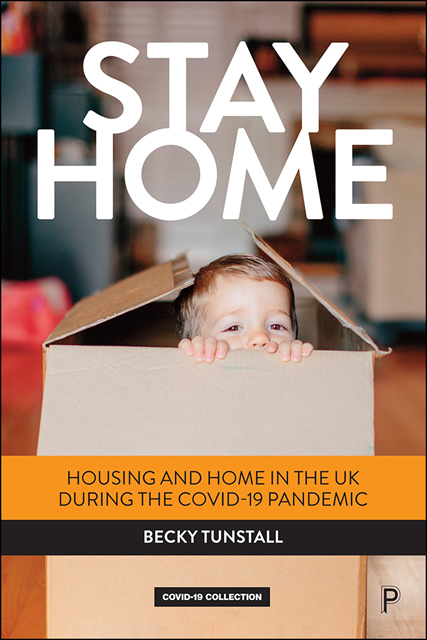Book contents
- Frontmatter
- Contents
- List of figures, tables and photos
- Acknowledgements
- 1 COVID-19, housing and home
- 2 UK households and homes before the pandemic
- 3 The pandemic and pandemic policy in the UK
- 4 People, households and time at home in the pandemic
- 5 The role of household and home in COVID-19 infection and death
- 6 Being vulnerable or ill at home in the pandemic
- 7 The impact of COVID-19 and COVID-19 policy on incomes, housing costs and housing security
- 8 The impact of COVID-19 and COVID-19 policy on the housing market
- 9 Summary and conclusions
- Appendix: The data from people aged 19, 31, 50, 62 and 74
- Notes
- References
- Index
1 - COVID-19, housing and home
Published online by Cambridge University Press: 20 June 2023
- Frontmatter
- Contents
- List of figures, tables and photos
- Acknowledgements
- 1 COVID-19, housing and home
- 2 UK households and homes before the pandemic
- 3 The pandemic and pandemic policy in the UK
- 4 People, households and time at home in the pandemic
- 5 The role of household and home in COVID-19 infection and death
- 6 Being vulnerable or ill at home in the pandemic
- 7 The impact of COVID-19 and COVID-19 policy on incomes, housing costs and housing security
- 8 The impact of COVID-19 and COVID-19 policy on the housing market
- 9 Summary and conclusions
- Appendix: The data from people aged 19, 31, 50, 62 and 74
- Notes
- References
- Index
Summary
The pandemic 2020–22
National government instructions to citizens, 2020
Stay home, stay at home – UK
Restez chez vous – France
Stai a casa – Italy
Quedate en casa – Spain
Bleib zuhause – Germany
Blijf thuis – The Netherlands
Zostan w domu – Poland
μένω σπίτι – Greece
A sta acasa – Romania
Zustat doma – Czechia (formerly the Czech Republic)
Ficar am casa – Portugal
On 31 December 2019, a cluster of pneumonia cases was reported by the Wuhan Municipal Health Commission in China. These cases were to be identified as a novel coronavirus, to be named SARS-CoV-2 or COVID-19 for short. On 30 January 2020, the World Health Organization (WHO) reported almost 8,000 confirmed cases worldwide. Most of these were in China, but 18 other countries had already been affected. The first people to be diagnosed with lab-confirmed COVID-19 in the UK were a mother and son in York on 30 January 2020. Concern grew, and in the week to 28 February, the FTSE 100 lost 11%, its worst week since the Global Financial Crisis (GFC) in 2008. On 3 March, day 33 of the UK pandemic, a person who had tested positive for COVID-19 in the UK died – the first of what were to be over 164,000 deaths in the UK and among the more than six million worldwide by March 2022.
The COVID-19 pandemic was a very rare event. Over a compressed time period, it involved almost everyone in the world. Almost everyone has had to stay home for at least some time. Everyone has a story, and each story forms part of the whole picture.
The next day, on 4 March 2020, I was at a meeting in Brussels with civil servants and academics from around Europe. The other UK invitees had not turned up because their universities had suddenly stopped them from travelling because they were unsure if their insurance would be valid. As we left, I avoided handshakes and said, half-joking, that this might be my last trip abroad for a while – the continental Europeans joked back, assuming I was referring to Brexit. (Seven months later, we all met again, on Zoom, to allocate money for research on COVID-19.) On day 37, a friend and I were enjoying a weekend in Bridlington in Yorkshire.
- Type
- Chapter
- Information
- Stay HomeHousing and Home in the UK during the COVID-19 Pandemic, pp. 1 - 10Publisher: Bristol University PressPrint publication year: 2022



